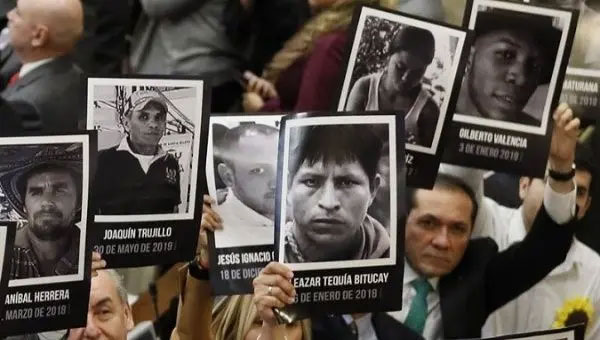Penang, Malaysia — Amid the COVID-19 pandemic, at least four land rights defenders are killed, arrested, or detained every week. Regional advocacy group PAN Asia Pacific’s (PANAP) monitoring of these human rights violations worldwide shows that the spike in such cases from mid-March to June 2020 has so far outpaced the frequency recorded last year.
Colombia and the Philippines, ranked in 2019 as among the deadliest places for rural people and their advocates, continue to have the highest number of land-related human rights violations during the pandemic (see table below). Other countries like Mexico and Indonesia account for several such cases, too. Repressive and flawed COVID-19 policies have proven not only unequal to the severity of the crisis, but also exacerbated a culture of impunity and paved the way for such opportunistic injustices.
Number of victims of land-related human rights violations in Colombia and the Philippines, in 2019 and midyear of 2020

In Colombia, lockdown protocols are intensified, leaving social leaders and mostly indigenous and Afro-Colombian communities more vulnerable to criminal gangs and paramilitaries associated with mining companies, drug traders, and timber traffickers. The power struggle between these armed actors has alarmingly caught previously guerrilla-held areas in the crossfire since the Colombian government and the insurgent group FARC signed a peace deal in 2016.
The pandemic has not eased the tensions. Between mid-March and June 2020, a total of 32 social leaders in rural regions were killed; 13 were threatened, harassed, or physically assaulted; and around 1,640 individuals were displaced from their communities, based on PANAP’s monitoring.
As early as March, Carlota Isabel Salinas Pérez, a human rights defender, became one of the first victims of violence in Colombia that has been masked by the global attention to COVID-19. Having just gathered food donations to peasant families in her community, she was murdered by unknown assailants outside her home in the municipality of San Pablo, in the department of Bolivar (308 kilometers north of Bogota).
The situation fares no better in the Philippines, where, during the same period, 16 peasant rights advocates were killed — or at least one every week. The murder of Nora Apique, a 66-year-old peasant leader, is illustrative of what has long been a pattern of violence under the Duterte government. Unidentified gunmen shot her to death on her way home last March 31 in San Miguel, Surigao del Sur, in southern Philippines.
Within just 14 weeks of when regional lockdowns were imposed in the country, PANAP’s monitoring also recorded almost the same number of cases of legal persecution as last year’s, with three rural people detained or arrested weekly. In one such case, in April, local police illegally detained a group of COVID-19 relief volunteers, including a former lawmaker, in the town of Norzagaray in Bulacan province (54.5 kilometers north of Manila).
Various human groups have been decrying the Philippine government’s heavily militarist COVID-19 measures and using the pandemic to pass a controversial Anti-Terrorism Law. This follows the global trend of authoritarian regimes’ attempts to provide justification for and legitimize attacks on critics, activists, and the sectors they are advocating for.
“We reiterate the calls for an end to the sweeping crackdown on land rights defenders as the coronavirus takes hold. We urge state authorities to probe into, and prosecute the perpetrators of, flagrant violations that facilitate graver repression of people’s political and civil rights, as well as social, economic and cultural rights,” PANAP executive director Sarojeni Rengam said.
At the same time, Rengam stressed that governments must provide much-needed aid to rural communities who are the most vulnerable to risks during this difficult time, yet who also remain the most persecuted.
Reference: Ms. Sarojeni Rengam, Executive Director, sarojeni.rengam@panap.net








Discussion about this post